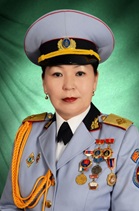男女共同参画推進委員会のホーム![]() 世界の国々から
世界の国々から![]() 男女平等に関する最近の動き
男女平等に関する最近の動き
男女平等に関する最近の動き

Ms. Otgontsetseg Dugarjav
Current Status of Gender Equality Action 男女平等に関する最近の動き
.
Ms. Otgontsetseg Dugarjav (モンゴル在住)
Pedagogical Doctor /Ph.D/ Major, Officer in 186th Military Unit
.
I got request for write a short essay about Gender Equality while I was participating Meeting of Asia and Pacific Nation Network and International Conference of Women in Science, Technology Engineering and Mathematics. So I’m writing this essay about Gender Equality.
.
私が国際女性技術者科学者技術者アジアパシフィックネットワーク会議に参加した時、男女平等に関するシュートメッセージの執筆を依頼されました。そこで、私はこのエッセイを書いています。
.
It isn’t hidden issue that female right is violating in time that we are living. There is no reason reconcile with this for women. So I am trying to give an answer for what is Gender Equality? And what kind of activities run for this in Mongolia?
Gender Equality is violated by time-space, environment, empowerment and even government relations. Briefly, gender equality gives chance to receive equal treatment both men and women. Otherwise, the Law of Gender Equality finds ways to balance the social system that seeks to provide men and women’s difference. Whereas, opposite situation is gender inequality. The result of stopping the discrimination of sex, both men and women can freely participate in social life in Mongolia. Therefore it gives chance to earn equal efficiency from politic, economic, society and culture thus gives duty responsible for both sex. Furthermore, gender equality accepts man and woman’s differences, values and tries to keep balance of par situation.
In Mongolia, 2011 was the time that we started to use term gender as real because of the Gender Equality Law has been legislated. Man and woman’s parity dis-balanced in workplace and decision making position which was the main influenced issue to legislate this law, even there hasn’t inequality among Mongolians. Male and female gender balance declines on work and position. Government adopted a following law to release it. Including:
Representation of any one sex among politically appointed civil servants shall not be less than 15% on national, aimag and the capital city levels, 20% on district, 25% on soum and 30% on khoroo. Whereas, representation of any one sex in decision-making positions in public administration shall not be less than 15% among state secretaries and heads of agencies, 20% among managers in other central agencies, 30% among heads of department in ministries and agencies, 40% among heads of secretariats, departments and divisions on aimag, city, soum, duureg and khoroo.
In a case of predominance of one sex among the staff of a state or public budget organization, the organization shall in its human resource policy incorporate and implement special policies and measures aimed at ensuring a balanced gender ratio 40:60. This law is playing important role to keep sex relation closely, and seeks to reach male workers number at least 40% such as women predominated education and health sector.
According to the law, public institutions and at the national committee, board, commission, consultation or co-management of the organization, including representatives of all the members of one sex are less than 40%. The state budget and the organization of any gender representation among the staff of sheer dominance cases, the sex ratio to 40:60 to create the conditions to ensure a balance is provided by law.
Indeed, it’s time to recognize that all types of social problem would solved by Gender Equality Law.
現在、女性の権利が蔑ろにされていることは覆い隠された問題ではありません。女性はそのことに妥協する必要はないのです。 そこで、「男女平等とは?」「モンゴルではどのような活動が行われているのか?」に対する現状を紹介したいと思います。
男女平等は、自分のための時間や場所、環境、権限そして政治おいてにさえ侵害されています。端的に言えば、男女平等は、男女間での同等な扱いを受ける機会を提供するものです。
他の見方をすると、男女平等のための法律は、男女間の差を埋めるために社会システムの中でどうバランスをとるか、という問題への答えを見つけるものでもあります。その対岸にあるのが男女不平等の問題です。性別による差別をやめた結果、モンゴルでは男女双方が自由に社会生活に参加することが出来るようになりました。それによって、政治的、経済的、社会的に等しく利益を受ける機会を得ることができると同時に、男女双方に義務と責任を求めることとなるのです。さらに男女平等は、男女間の違いや価値観を受け入れ、様々な状況においてバランスを維持します。
モンゴルでは、男女平等に関する法律が2011年に施行されました。職場や意思決定の場で、男性と女性の平等はバランスがとれておらず、この法律を作ったときに問題となるまでは、モンゴル人の間では不平等という認識すらありませんでした。男女間のバランスは、仕事と立場で偏っています。政府はそのような偏りをなくすため、次のような法律を作りました。
公務員の割合に関しては、一方の性が、国、県と首都レベルでは15%、地区では20%、郡では25%、村では30%以下にならないことを求めました。一方で意思決定権者に関しては、一方の性が、州の書記官と長官は15%、他の中央機関での管理職は20%、省庁の部長クラスは30%、県、市、郡、地区等各自治体の部長課長クラスは40%以下とならないことを求めました。
国または自治体の予算委員会の中で片方の性が優勢であった場合、組織は性別を40:60の割合で保つことを優先させなければなりません。この法律は性別比率を保つ上で重要な役割を果たしており、女性の割合が優勢となっている保健・教育機関などにおいては、男性職員の割合が少なくとも40%になるようにしています。
法律に従い見てみると、公共委員会、国家委員会、理事会、委員会、相談役または役員委員会における代表者も含めたメンバーの一方の性は40%未満です。
実際、あらゆる種類の社会的問題は、男女平等に関する法律によって解決されることを認識するときに来ているのです。
(原稿受理日:2015.7.15)
このページのお問い合わせ:男女共同参画推進委員会
「IPEJ」,「日本技術士会」,「技術士会」,「CEマーク」及び「PEマーク」は、公益社団法人日本技術士会の登録商標です。
公益社団法人 日本技術士会 / Copyright IPEJ. All Rights Reserved.

